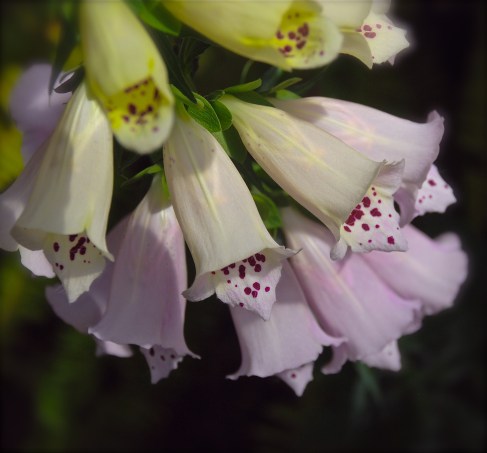No child but must remember laying his head in the grass,
staring into the infinitesimal forest
and seeing it grow populous with fairy armies.
~Robert Louis Stevenson, Scottish poet
Digitalis, from the Latin Digitabulum, a thimble, derives its common name from the shape of its flowers that resemble the finger of a glove. It’s a flower we call Foxglove, which delights to grow in deep hollows and woody dells. However, it was originally called Folksglove because that’s where they, fairies or “good folk,” were thought to live. Folksglove is one of the oldest names for Digitalis (Foxglove) and is mentioned in a list of plants as old as the time of Edward III. The earliest known form of the word is the Anglo-Saxon foxes glofa (the glove of the fox, and the Norwegian name Revbielde that translates to Foxbell alludes to the Fox. It is a name which may have come about from a northern legend about bad fairies who supposedly gave the blossoms of Digitalis to foxes to be put upon their toes so as to soften their tread when prowling amongst the roosts.
I adore Foxglove and believe no other flower in the garden lends itself better to stories of fairies and elves than it does. Its dangling thimbles or gloves or bells or fingers or whatever one might call them look like enchanted, magical places where children would naturally look for the “wee folk” to lurk. Nor is it surprising that there have been suppositions claiming the mottling in the flowers mark, like the spots on butterfly wings and on the tails of peacocks and pheasants, where elves have placed their fingers. Though no longer a child, I have to agree in part with the writer Charles de Lint who penned, “We call them faerie. We don’t believe in them. Our loss.” Sometimes, it does one a world of good to remember what it was like to be an imaginative child, full of awe and wonder and given to flights of fantasy.
Happy is he who still loves
something he loved in the nursery:
He has not been broken in two by time;
he is not two men, but one,
and he has saved not only his soul but his life.
~G. K. Chesterton, English writer, poet,
and lay theologian
If we opened our mind with enjoyment, we might
find tranquil pleasures spread about us on every side.
We might live with the angels that visit us on every sunbeam,
and sit with the fairies who wait on every flower.
~Samuel Smiles, Scottish author
May the Lord give you increase, both you and your children. May you be blessed by the Lord, who made heaven and earth. ~Psalm 115:14-15 ✝



Pingback: 297. Hand in hand, with fairy grace, will we sing, and bless this place. ~William Shakespeare, English poet and playwright | Sacred Touches
Amen to your words and image. . .
“…Come away, O human child!
To the waters and the wild
With a faery, hand in hand,
For the world’s more full of weeping than you
can understand…”
Yeats
LikeLike
Thanks, Cookie. I almost used that very quote by Yeats for this post! xoxoxo 🙂
LikeLike
Love the Foxglove!
LikeLike